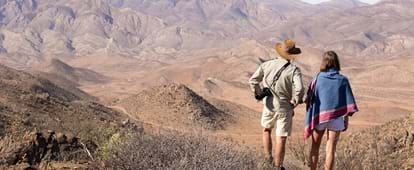By creating an account, I agree to the
Terms of service and Privacy policy
Choose your country and language:
Africa
Americas
Asia Pacific
Europe
The /Ai-/Ais-Richtersveld Transfrontier Park is a cross-border conservation initiative between South Africa and Namibia. It brings together the Richtersveld National Park, managed jointly by the local Nama people and the South African National Parks Board, with Ai-Ais Hot Springs Game Park, the Namibian side of this initiative. To the north of the park is the Richtersveld Cultural and Botanical Landscape, a UNESCO World Heritage Site. It constitutes a cultural landscape that is communally-owned and managed by the Nama people. The area sustains their semi-nomadic pastoral livelihood and is the only place where the Nama still construct portable rush-mat houses (haru om).
The best-known endemic plants found in the park are the stem succulents, known as the halfmens, and the giant tree aloe or quiver tree. These, and thousands of other species, live off the early morning fog, called 'Malmokkies' by the local people, that rolls in off the waters of the Atlantic Ocean.
The wildlife found in the area is adapted to withstand the arid climate. Many species are concentrated in the denser vegetation around the Orange River, including over 50 species of mammals and almost 200 bird species.

BBones uncovered at Kokerboomkloof reveal that some of the animal species currently present in the region, such as springbok, zebra and klipspringer, were also present over 4 000 years ago. The area also boasts a large variety of lizards and snakes.
The Ai-/Ais-Richtersveld Transfrontier Park also features the world's second largest canyon, the Fish River Canyon, which meanders between the spectacular cliffs characteristic of the desert landscape.
The park geography features many distinct periods of geological history dating back 2 000-million years and the Orange River mouth is a Ramsar site, which means that it is a wetland of international importance.
But it is the uniquely adapted vegetation of this region that makes this the world's only arid area biodiversity hotspot.
TTravel tips & planning info
Who to contact
Ai-Ais Transfrontier Park
Tel: +27 (0)27 831 1506 (Reception)
email: richtersveld@sanparks.org
How to get there
The quickest way to get to the Richtersveld Transfrontier National Park is on the N7 highway, turning off at Steinkopf and approaching the park via Port Nolloth and Alexander Bay.
Note: You will need a 4x4 vehicle to explore the park, although high-clearance vehicles may also enter the park. Sedan cars will not be allowed to enter the park.
Best time to visit
The /Ai-/Ais-Richtersveld climate is extreme, especially in mid-summer. For this reason, many people prefer to visit the park in the cooler months between April and September. Activities should be restricted to early mornings and late afternoons. Nights are cool in summer, but get very cold in winter.
Things to do
Flower season in the desert is spectacular and depending on the rains, occurs between June and October. You can also enjoy bird watching and guided trails between April and September.
From Sendelingsdrif you can take the pontoon across the Orange River to the very popular Ai-Ais Hot Springs Resort in Namibia.
What to pack
You need to be sure that you have enough water and fuel at all times. Diesel and 97 octane petrol is available at Sendelingsdrif, but the nearest supply of unleaded petrol is at Alexander Bay, 80km away. Plastic refuse bags are essential as all rubbish must be removed from the park when you leave. Insect repellent, sunscreen and a hat are a must.
Where to stay
The park has a number of accommodation options on offer, from rustic campsites to a fully equipped rest camp at Sendelingsdrif.
What to eat
You will need to cater for yourself and bring along sufficient drinking water, unless you are part of an organised tour group. There is a small general store at Sendelingsdrif, but it is only open weekdays.
Related links
- Richtersveld Route
- Richtersveld Community Conservancy guest houses
- The Richtersveld Cultural and Botanical Landscape
- Ai-Ais Hot Springs Game Park

